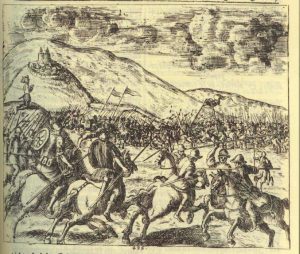The Battle of the Frigidus transpired from September 5 to 6 in the year 394 between the forces of Roman emperor Theodosius the Great and the usurper Eugenius. This took place in Roman Italia along the eastern boundary of Regio X, with the Roman emperor coming out as the victor, preventing the rise of Eugenius and Arbogast.
Background
Valentinian II, the western emperor, died in his living quarters in Gaul on May 15, 392. The eastern emperor, Theodosius, received the information from Arbogast, who was Valentinian’s magister militum or “master of soldiers.” Theodosius was told that the fallen emperor committed suicide, but his wife convinced him that ill intent was involved in Valentinian’s death.
Arbogast attempted to communicate with Theodosius several times throughout the summer, but Rufinus, his chief minister or praetorian prefect, did not deliver the messages to the eastern emperor. Anticipating hostility, Arbogast decided to act first.
On August 22 of the same year, Arbogast proclaimed Eugenius as the new western emperor with the praetorian prefect of Italy, Nicomachus Flavianus, affirming this announcement. Eugenius’ image suited the throne more than Arbogast, who did not garner the same respect. The senior civil servant Eugenius was highly regarded as a scholarly native Roman.
Theodosius lost substantial control over Rome’s western half, partly because Eugenius replaced the eastern emperor’s loyal supporters from their high civil office posts. Additionally, western ambassadors confronted Theodosius about Eugenius’ elevation, asking that the usurper be accepted as the new western Roman emperor. However, Theodosius did not show his support for the idea; despite bestowing gifts and false promises upon these guests. He proceeded to elevate his son, Honorius, to the position of the western Augustus, his co-emperor. In January of 393, he headed west to claim the land.
Preparations for Battle
Theodosius had to raise an army to conquer western Rome. There were limited soldiers after the Battle of Adrianople, with Emperor Valens in the lead. This was considered one of the biggest Roman losses of the time. The generals Flavius Stilicho and Timasius trained and recruited soldiers to battle against the west.
Eutropius, who was a eunuch and an adviser to Theodosius, journeyed to ask for guidance from a Christian monk in the town of Lycopolis. The monk foresaw an expensive war eventually ending in Theodosius’s victory.
Theodosius’ army safely traveled to the Western army’s encampment without any hindrances from their opponents. This was largely due to Arbogast’s observations of Theodosius’ war against Magnus Maximus, which prompted him to keep the western army together. The western army was composed of the Alemanni, Franks, Gallo-Romans, and additional Gothic support.
The Battle
The battle was set on the Frigidus River in the eastern Alps from September 5 to 6, 394. On the first day of the battle, Eugenius and Arbogast had a strong start, while Theodosius had massive casualties. The eastern emperor had placed his Gothic auxiliaries at the frontlines in the hopes of lowering their numbers as they were also possible threats to Rome. Theodosius was in a rush at the beginning of the battle and lacked strategic planning concerning the geography of the area. On the other hand, Eugenius and Arbogast had positioned a statue of Jupiter on the end of the battleground to pay tribute to the old gods of Rome. The battle was seemingly in their favor.
The tides changed on the second day as several soldiers on Arbogast’s side switched to join Theodosius’ troops. The weather was also in their favor. A strong tempest passed across the valley from the east. The western forces had dust cloud their vision, and they were buffeted by the storm. Arbogast’s soldiers were disorganized, and his lines broke, marking the decisive victory for Theodosius’ army.
Eugenius was later held captive and made to stand before Theodosius. Despite his pleas, Eugenius was shown no mercy and was executed while Arbogast escaped, but later committed suicide because he understood that there was no way to successfully escape.
